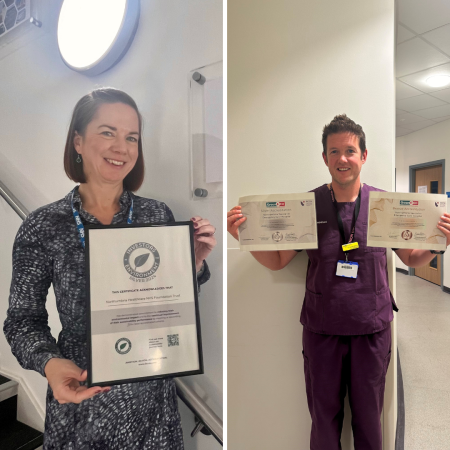Publish date: 23 October 2024
Double success for Northumbria Healthcare as it achieves two silver accreditations for its commitment to sustainability

Northumbria Healthcare NHS Foundation Trust is celebrating not one but two silver accreditations for its continuous efforts to improving sustainability.
The trust has achieved Silver Accreditation with the national environmental accreditation scheme, iiE (Investors in the Environment). The Investors in the Environment (iiE) is a prestigious recognition awarded to organisations demonstrating exceptional commitment to improving their sustainability efforts.
The trust originally applied to achieve Bronze Accreditation but due to ongoing efforts to improve sustainability, they surpassed the level for Bronze and achieved Silver Accreditation with a score of 77%.
To achieve Silver-level accreditation, an organisation must continue to develop and implement its Environmental Management System and put forward a range of projects that will support continual improvement in resource and carbon management. Silver accredited organisations will also need to implement a travel plan, improve upon waste management practices and manage staff communication and engagement.
The trust’s emergency department has also received silver level accreditation from the Green ED Royal College of Emergency Medicine (RCEM).
The initiative is a framework of evidence-based actions split into bronze, silver and gold levels. For an emergency department to achieve this accreditation, they must complete all the actions of the level they are applying for and those of the previous level. Northumbria Healthcare’s emergency department, based at the Northumbria Specialist Emergency Care Hospital in Cramlington, is one of only two in the country to have been awarded the silver-level accreditation.
By their nature, emergency departments are resource-heavy, so they are a key area to target to reach the wider NHS goal of net zero by 2040. Green ED is a sustainability initiative from RCEM to reduce the environmental impact of emergency departments across the UK.
Actions cover clinical, medical and behavioural changes that all contribute to a reduction in carbon emissions. Two key actions that have had special mention include implementing a no idling policy outside of the emergency department, with the support of the North East Ambulance Service, and significantly reducing the use of nitrous oxide by introducing Penthrox which has less impact on the environment than Entonox, which was previously used.
All the changes that have been made across the department have an estimated annual carbon saving of 37,500kg of CO2e, which is the equivalent of approximately 96,000 miles in a petrol car.
Clare Winter, head of sustainability, said: “Both accreditations are an incredible achievement for our emergency department and our trust. As a trust, we are committed to creating cleaner air surround our hospital sites for our patients, visitors and staff.
“These achievements not only encompass the work of the sustainability and Green ED but also wider staff within our trust who have supported our developments and have embraced change in order to contribute to our net zero goal.”
James Walton, Emergency Department Consultant and project lead, said: “To be one of only two emergency departments to have achieved a silver accreditation is fantastic and is down to the dedication shown by the team. Originally, we had only set out to apply for bronze but due to ongoing efforts, we realised how close we were to completing all the silver actions.
“The biggest challenge throughout this has been keeping up the momentum of the project whilst running a busy emergency department, as maintaining high levels of patient care is always our top priority. Developing the role of a sustainability fellow who could dedicate one day a week to sustainability projects was the biggest game changer in allowing us to make significant progress.”
Most recently, the trust signed a commitment alongside the North East Ambulance Service and Newcastle Hospitals to stop the idling of ambulances and vehicles after patient drop-off at the Northumbria Specialist Emergency Care Hospital. The commitment aims to reduce the number of vehicles that leave their engines running whilst stationary and this has been introduced into staff and public car parks also.
Future projects planned in line with the trust’s net zero action plan include advancing waste management processes and working on sustainable procurement models and going paperless to contribute to the trust’s net zero target.
Media contact
Emily Lavin, marketing and communications officer
emily.lavin@northumbria-healthcare.nhs.uk
